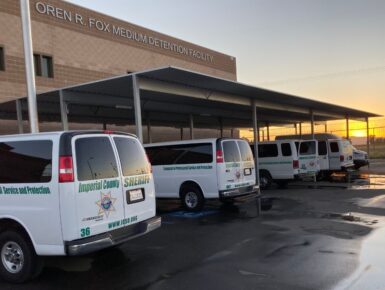
Jail Information

ICSO Jails
The Imperial County Sheriff's Office, Corrections Division operates three jail facilities with combined bed space of 876 beds; housing male and female, sentenced and non-sentenced county and federal within the Imperial County.
The Herbert Hughes Correctional Center (HHCC) was built in the early 1960’s and was named after Sheriff Herbert Hughes who served from 1955-1966. HHCC consists of six dormitory style housing areas referred to as dorms with a total bed space of 314 beds. HHCC houses a full working kitchen where prescreened incarcerated workers receive valuable vocational training and work experience preparing three meals a day and run a hot food services line that provides meals to all three jail facilities. HHCC boast a large multipurpose room which is centrally located within the housing units and is used as educational programming space which has allowed a multitude of incarcerated persons to receive their GED or High School Diploma. Having programming space line the multipurpose room is imperative to restorative justice of offender reentry and recidivism reduction programs. The majority of the incarcerated persons housed at HHCC are actively working and participating in incarcerated person programs provided to them both in and out of the housing areas. Each dorm was issued tablets that are utilized to submit incarcerated person request, medical request, grievances and to get in contact with their family members. The sentenced incarcerated persons housed at HHCC that are working and actively programming can earn in-person visitation located on the front lawn outside of the facility to re-establish bonds and connections with children and family members through family reunification service programs.
The Oren R. Fox Medium Security Detention Facility (OFDF) process began in 2011 when the County applied for a grant to build a new jail facility. The State of California allotted 33 million dollars for the construction of the new facility that began in August 2016. OFDF features six two-tiered housing areas referred to as units, each unit can house 45 incarcerated persons in addition to having a state-of-the-art Medical Center that can house an additional four incarcerated persons creating a total of 274 beds. In September 2018, the Imperial County Sheriff's Office began housing incarcerated persons within OFDF. OFDF was named after Sheriff Oren R. Fox who served as Sheriff of Imperial County from July 1973 to December 1974, and January 1979 to January 1999. During the construction of the facility ensuring that the design featured ample programming space was vital. Prior to the opening of OFDF, the multipurpose room at HHCC and the Second Chance Classroom at RADF were the only spaces available to provide educational programs to the incarcerated population. All of the new rooms were named in honor of past and present employees of the Sheriff's Office and volunteers from different community organizations. Kitchen Supervisor Luis Avalos Teaching Kitchen; Correctional Sergeant Ted Christianson Briefing and Training Room; Gaylla Finnell Programming Classroom; Sheriff Raymond Loera Conference Room; Undersheriff Federico Miramontes Staff Break Room; Correctional Officer Hector Ramirez Briefing and Training Room; and Lance Reeves Programming Classroom. Having this new facility has created many opportunities to provide additional staff trainings as well as increase access to incarcerated person programs.
The Regional Adult Detention Facility (RADF) was built in the late 1970’s and housed incarcerated persons in August 1981. RADF is a linear style facility with twelve two-tier housing areas referred to as modules, each module is made up of cells in which up to two incarcerated persons can be housed per cell with a total bed space of 288 beds. RADF house the jails main medical center, which includes one male and one female medical housing unit each with five beds available. Each medical unit contains a respiratory isolation room and allows incarcerated persons with medical needs safe and direct supervision. All incarcerated persons are first housed at RADF while awaiting medical screening and classification interview. Upon completion, an incarcerated person can remain housed at RADF or be transferred to OFDF or HHCC. In 2017, through grant funding, RADF received its first educational and vocational programming space, the Second Chance Classroom. All the Second Chance Classroom construction was completed by incarcerated person housed in HHCC at the time and were participating in a IVROP instructed vocational training program.
Telmate Kiosk
Incarcerated Person Mailing Address
Effective Tuesday, September 3, 2024, All personal mail must be sent to the address listed below.
Personal mail that is received at the 1328 Sperber Road address will be returned to sender.
When sending money orders, the money order shall be the only contents of the envelope.
Prison Rape Elimination Act (PREA)
It is the policy of the Imperial County Sheriff’s Office (ICSO) to comply with the provisions set forth in the Prison Rape Elimination Act (PREA). ICSO has established a “Zero Tolerance” policy for sexual misconduct for incidents involving incarcerated person-on-incarcerated person sexual violence and staff misconduct or harassment towards incarcerated persons, regardless if it is consensual or not.
Incarcerated Persons with Mental Health
K-9

The Imperial County Sheriff’s Office takes great pride in its K-9 Unit because of the proficiency, ability and utility of the canines working in partnership with their handlers and the community. The Canine program was established to augment searches of the facility and decrease the amount of contraband.
- Trained teams of handlers and canines have evolved and are used to assist staff to locate contraband.
- Currently the Imperial County Sheriff’s Office has a Canine team of Correctional Canine Handler C. Armstrong and his Canine Reddick.
- Reddick is a Narcotic Detection Dog (NDD).
- Reddick is a rescued dog, Lab/Border Collie mix and trained in detecting narcotic odor.
Transportation

Contact Phone:
The Imperial County Sheriff’s Office Transportation Unit is staffed with Correctional Officers and Correctional Supervisors to oversee the daily activities. The transportation fleet is equipped with dividers to accommodate the different incarcerated person classifications.
Transportation Fleet :
- 2 Buses
- 7 Vans
Transportation works in a collaborated effort with numerous agencies to transport incarcerated persons to various destinations:
- Court
- Jail
- Prison
- Medical Appointments
- Other locations
The transportation staff also provides additional court security for custody prisoners, and is assigned to pick up incarcerated persons who have warrants within the State of California who are housed at another jail or prison.
Day Reporting Center

The Imperial County Day Reporting Center (DRC) opened in March, 2014 to help manage low-level incarcerated persons and probationers supervised under California’s prisoner realignment legislation.
As part of this AB 109 legislation, the state provides funding to counties for the implementation of evidence-based programs. The DRC uses Motivational Interviewing techniques and a curricula-driven, evidence-based model designed to assess the needs of each client to reduce individual risk factors. The services are geared to help offenders succeed and reintegrate into the community. Treatment and training are designed to change thinking that can lead to criminal behaviors.
As part of this AB 109 legislation, the state provides funding to counties for the implementation of evidence-based programs. The DRC uses Motivational Interviewing techniques and a curricula-driven, evidence-based model designed to assess the needs of each client to reduce individual risk factors. The services are geared to help offenders succeed and reintegrate into the community. Treatment and training are desiThe DRC is staffed by members from the Sheriff’s Office, Probation, Behavioral Health; a GEO reentry Services.gned to change thinking that can lead to criminal behaviors.
Some of the courses offered:
- Cognitive Behavioral Therapy
- Anger Management
- Moral Recognition Therapy
- Employment Readiness
- Parenting Skills
- ESL (Imp. Co. Library)
- AA / NA
Rehabilitation services:
- Behavioral Interventions (GEO)
- Imperial Valley College (Inside/Out)
- Imperial County Behavioral Health
- Department of Social Services
- Remap
Incarcerated Programs

Individuals housed at the Imperial County Jail are given the opportunity to take part in worker programs. The program maintains a safe working environment and educational opportunities for the incarcerated population. All individuals are screened based on their charges for proper work assignment and class.
Educational Programs:
- G.E.D.
- E.S.L.
- Volunteers of America
- 24/7 Dad
- Second Chance
- Anger Management
- Inside Out
- 24/7 Mom
- AA/NA
- Family Literary Events
Worker Programs:
- General grounds clean-up
- Roadside clean-up
- Culinary
- Commissary
- House Keeping
- Laundry Services
- Car Wash
Outside crews must be:
- Sentenced
- Free from violent and or sexual crimes
- Not on disciplinary sanctions

In order to be part of the worker program, an incarcerated person has to go through medical screening and clearance. The Classification Unit also conduct a review of the applicant. Incarcerated persons are then placed at different work areas based on their classification level. Incarcerated persons are paid weekly and have to work more than 30 days to obtain 6 days of work credit. Incarcerated persons sentenced under AB 109 (serving state prison in a county facility) are granted no more than six weeks work credit per year under AB 624. Incarcerated workers must be in educational programming to obtain credits.

Incarcerated workers who successfully complete and graduate from educational courses take part in graduation ceremonies accompanied by family members. This creates motivation and a feeling of begin part of the community. Incarcerated workers have taken advantage of the opportunity of our educational programs. Class attendance has increased and we have seen an increase of graduates.
Pretrial Services
Pretrial Services were taken over by the Imperial County Probation Department.

